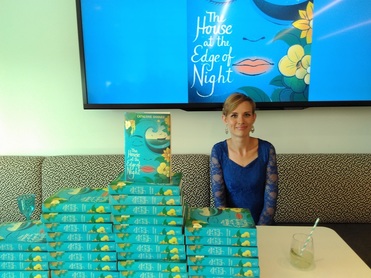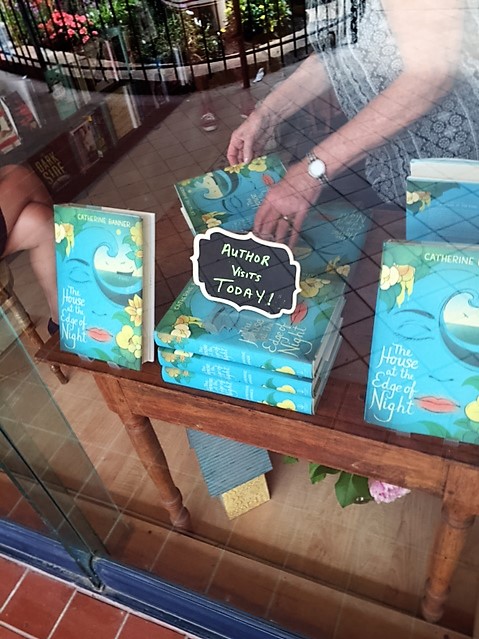Writing is an odd profession, and people have plenty of theories about why we do it. Some think writers write for fame, or money. Some think that they write to create something beautiful that will outlast them. Some think they do it for critical acclaim, or for prizes. To a writer, by contrast, most of these theories ring false. No writers are famous, and no fame is a pleasant thing to have in any case (just look at Hollywood celebrities). Posterity too is an odd, insubstantial reward, more theory than practice. No writer who has thought about it for five minutes can seriously think their work will outlast them in any way that will make much difference to them once they are gone. The world is 4.5 billion years old. We’ve managed to preserve Shakespeare’s plays for four hundred. A book is essentially a glossy magazine with a hardback cover. In relative terms, it is likely to be gone just as fast. And critical opinion is notoriously fickle: acclaim is by and large a matter of luck, of creating the thing which is just the right combination of new and familiar, while many serious writers are more interested in creating something entirely new which critics will possibly hate. There must be other reasons, then.*
*apart, obviously, from all the excellent ones these first-graders have already come up with
II
When I first became a writer, I wrote for the love of writing. I accepted payment for my work for the pragmatic reason that it helped me make my work better, and it funded me to continue to write. And it’s true that a lot of writers begin to write full-time, if they get the chance, because they love the day-to-day process of developing their craft. But without a clearer sense of mission, even this can become meaningless. How can I know in which direction to take my work, unless I know what I’m trying to achieve with it, and in whose footsteps I follow? Recently, talking to my agent about one of the writers I most admire, he said, ‘It’s an odd thing to be a writer, though: your life’s work essentially adds up to seven or eight books lined up on a shelf.’ Which, if you think about it one way, is utterly dispiriting. And yet, if you think about it another way, is a warning to make sure that work counts, to make sure the sense of purpose at the heart of it is substantial enough to sustain a writing life.
III
Here are some real reasons writers write, which I’ve heard over the years.
- Because it makes them happy. Because, day by day, they want to sit at their desk and make up stories, or entertain people, or create art. And according to their philosophy of life, the job that makes you happy is the one worth choosing.
- Out of a kind of curiosity, to see how far they can push the creative experiment they are engaged in, to see if they can make something which is formally new, or – occasionally – something singular and bizarre that they felt like creating anyway.
- In order to get better at writing: these writers, akin to an Olympic athlete, or an artist, see themselves as engaged in a lifelong struggle to master a craft. Warning: writers are usually rather solemn about this, but it's probably a necessary coping mechanism if you're going to write for a living.
- To bear witness to something, in themselves or in the world. Or, in the words of the first-graders, 'to tell about important events'.
- To connect with others, to communicate, to say something and to see that story resonate with the readers who encounter it, and hear those readers reply, ‘Yes, I have felt that too.’ Perhaps to make readers laugh. Perhaps, indirectly, also to help them feel a little less alone somehow.
- To return to certain themes which they wrote about a long time ago but which they don’t think they’ve yet plumbed the depths of; these writers write out of a kind of obsession, a feeling that they’ve still left something uncreated, or unsaid, and are usually partly motivated and partly annoyed by their inability to lay that obsession to rest.
- To write something which hasn’t ever been written before. As Milan Kundera put it, to attain ‘beauty in art: the suddenly kindled light of the never-before-said.’ As the first-graders put it: 'to express thoughts'.
- And probably, most commonly, some combination of all the above, coupled with a separate mission which is their own.
IV
A few years ago, when I was still a young adult writer, I attended a panel discussion at a literary festival in London. The first question was the usual first question: ‘Where do you get your ideas?’ This is a hard question for most writers to answer, and I’ll admit we struggled. Still, each writer took the question literally and did their best. The first said something like, ‘I often overhear conversations on the bus and that sparks something in my mind.’ The second said something like, ‘When going for long walks.’ Another talked about a real-life story she had read in the newspaper. Still others, including me, talked about the moment when they first began to sense that they had stumbled upon the spark for their novel: a conversation, a chance coincidence of events, the persistent voice of their main character. Then a fellow writer from a minority background spoke up. She got her ideas, she explained, from the fact that the folktales of her home culture weren’t ever written about in English. She wanted to put that tradition and its literature on the map. She wrote from that position of marginality, with a sharp sense of her own place in literature and her purpose as a writer: not just to be part of literature but to change it, to widen its borders. The rest of us, I realised all at once, had misunderstood the question. We were getting it all wrong. You get your ideas, your motivation to keep writing, from those things that preoccupy you, that consume you, that keep you awake at night. All the rest is just incidental.
V
After that day, this fellow writer’s clear-eyed sense of purpose kept coming back to me. Here was a writer who knew what she was doing and why. And, what was more, couldn’t all the writers I most admired say clearly what their mission as a writer was, too? It was already encoded, rather unsubtly, in their work. Derek Walcott: ‘we would never leave the island / until we had put down, in paint, in words… / all of its sunken, leaf-choked ravines’. Virginia Woolf: ‘I have had my vision’. And practically all of this interview with Gabriel García Márquez, which is basically one long, sometimes hilarious, mission statement.
VI
So now, when people ask me where I get my ideas from, I answer differently. I say, from the fact that I didn’t see many European writers of my generation writing about the financial crisis, and being young, and coming from a small town. Or, because I feel there’s an interesting story still to be told about how big historical events affect small places. Or, from a wish to write differently about the past. Or, because I felt that European history contains undiscovered stories about small communities which have something to say about our present circumstances. I say these things unashamedly, because that’s the real answer to the question of where our ideas come from. Out of a common wish that all writers share, not just to create literature, but to change literature, to widen its borders, and in doing so to widen all borders, just a little, perhaps.
VII
On the notice board beside my desk, I keep a rotating stock of quotes about writing. They are there to remind me of the spirit in which I should sit down to work each day, and rather than being inspirational, they are mostly rather discouraging and pragmatic. Here’s the first, from Robert D. Hamner on Derek Walcott:
‘His ability to renew himself, to revitalise his imagination, to rediscover the myth of his life and his culture, places him among the greatest poets of our century – poets who write out of their obsessions without repeating themselves.’
A writer’s aim: to write out of your obsessions without repeating yourself.
And here’s the second, the last verse of the poem ‘Curriculum Vitae’ by Samuel Menashe, which contains possibly the least glamorous portrayal of the writer’s life in the history of literature:
Time and again
And now once more
I climb these stairs
Unlock this door—
No name where I live
Alone in my lair
With one bone to pick
And no time to spare
With one bone to pick, and no time to spare, seems to me a pretty accurate portrayal of a life spent writing. Every day you climb the stairs, unlock the door, and return to the same themes, hoping to advance a little only in your ability to explore them. So if you’re going to spend your whole life picking the same bone, obsessively, over and over, it helps at least to be able to say what bone you’re picking, and why.




 RSS Feed
RSS Feed
